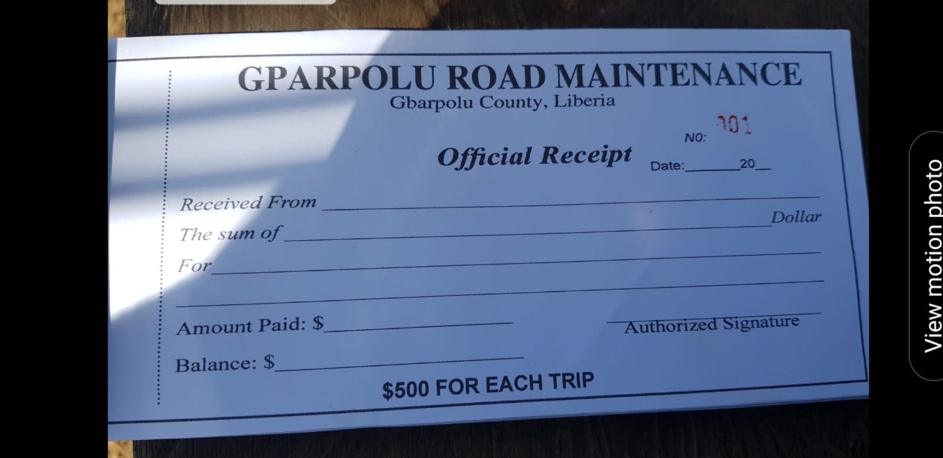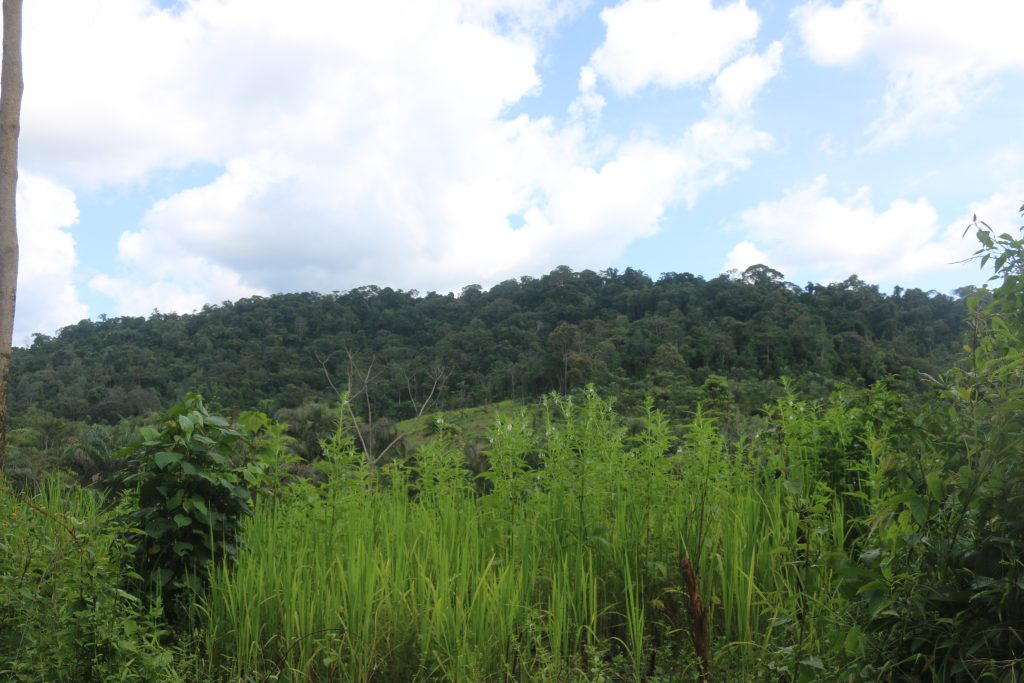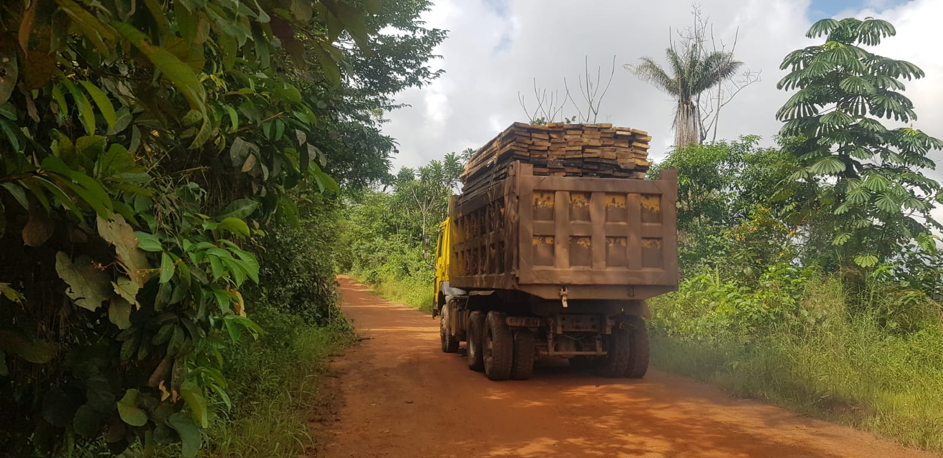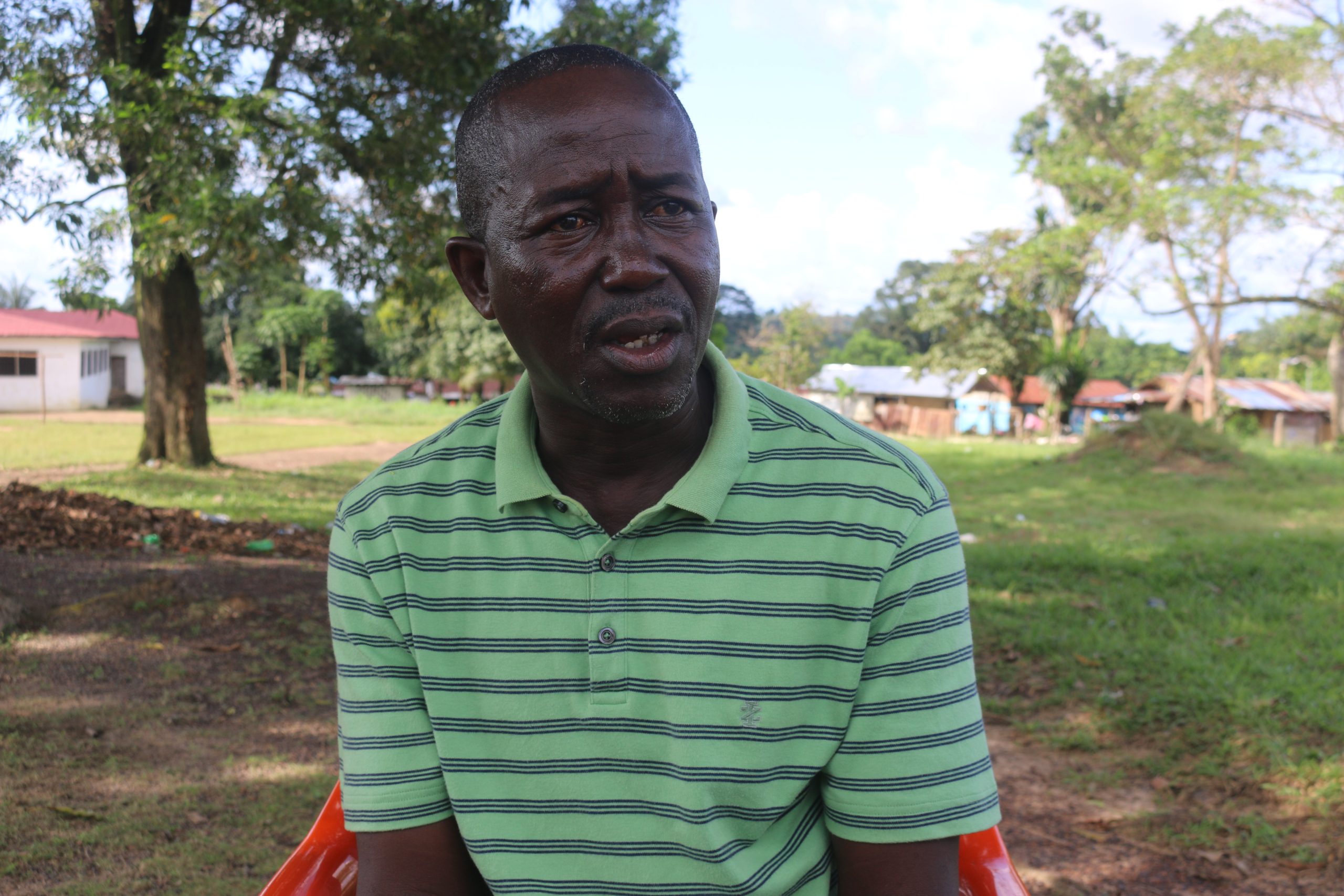Top: The Commissioner of Gbarma Alfred O. Bah illegally imposed L$500 on trucks transporting planks from Gbarpolu County. The police may have taken advantage of Bah’s wood truck restriction to allegedly solicit a bribe from transporters. The DayLight/James Harding Giahyue
By James Harding Giahyue and Tenneh Keita
GBARMA DISTRICT, Gbarpolu – Three or four years ago, Alfred Bah, the Commissioner of Gbarma District, decided to collect money for trucks transporting wood from the western county.
“When I took office, I was informed that the outgoing commissioner used to at least talk to the [wood dealers] … for district development,” Bah recalled in an interview at his office. “Whether I could do the same, I said ‘yes.’ For me, what I will do I will call the [wood dealers for] a meeting.’”
The meeting was held and the parties agreed that trucks carrying wood from Gbarpolu must pay L$500. The money would be used to repair a major stretch of road linking Gbarma to other parts of the county.
That day, Bah added to a list of county officials who misuse their power to exploit wood dealers across the country. The officials do not have the authority to impose a fee on wood or other goods, according to the Local Government Act and the Chainsaw Milling Regulation. The former law restricts such function to county councils, governance bodies which have not yet been formed in most counties, including Gbarpolu. The latter empowers the Forestry Development Authority (FDA) and local communities or private landowners.
This is The DayLight’s third story on the subject after an August investigation exposed the involvement of the Superintendent of Lofa County William Tamba Kamba in the illegal deal. The first implicated a regional collector of the Liberia Revenue Authority (LRA). The series sheds a light on an unregulated subsector of forestry engrossed in corruption and impunity.

‘L$500 for each trip’
Varney Freeman, a representative of plank dealers in Gbarpolu, worked with to Bah organize the scheme. They imposed L$500 on each truck carrying wood. A vacant receipt we obtained brandishes: “Gbarpolu Road Maintenance Official Receipt” and “L$500 for each trip.”
Freeman was responsible to make other plank dealers comply, though aware that the fee was illegal. “The [Commissioner] doesn’t have the legal power to impose fees on trucks plying the county’s roads but we are businesspeople,” Freeman said in an interview on his farm in Okai Village in November last year. Gbarpolu is one of the most forested regions in Liberia and a goldmine for many wood dealers. They are known in forestry as chainsaw millers from their use of the handheld device to make planks.
“If we want to fight all the legal things, we will not get our business going,” Freeman added.
So, trucks carrying wood began to pay the fee. A subbranch of the Forestry Development Authority (FDA) at Sawmill on the Bopolu highway collected the fees, according to Bah and Freeman. Rangers at the subbranch corroborated their story.
Bah claims he collected between L$16,000 and US$17,000 only, which was used to repair the road. Gbarpolu Superintendent Keyah Saah dismissed the claim, saying he (Saah) organized the youth to rehabilitate it instead.
The FDA rightfully collects US$0.60 on each plank transported across the country. However, those payments are not turned over to the Liberia Revenue Authority, the agency of the government that collects taxes. There is no public record the FDA accounts for the funds. It took the agency more than a decade to devise a regulation for the subsector yet it is not enforcing it. Such lawlessness makes it easy for Bah’s toll system and other illegalities to succeed.
But Bah’s system soon encountered a problem that would ultimately lead to its end, at least openly. First, some wood truckers refused to pay, arguing they did not take their planks from Gbarma and could not pay the district any toll. Second, there issues about the receipt capturing the entire county rather than just Gbarma. And dealers argued their vehicles were smaller than those of logging companies, several of whom operate in Gbarpolu.
“I insisted that I will not pay the L$1,500,” said Kent Mamay, a plank dealer in the VOA Community. “There was a heated argument between them and myself and at the end of the day they were able to release my truck.”
Amid the pressure, Bah halted the collection last year. He claims Gbarpolu County Assistant Superintendent for Development Joseph Akoi had ordered him to do so to avoid further problem. Akoi denies that, telling The DayLight in an interview in Bopolu he had not heard of a plank toll in Gbarma.
But plank dealers and drivers The DayLight interviewed said they still paid the fee while the system was halted. Varney Tulay, another wood dealer in VOA, said no receipts were being issued this time around.


“Like four to five months ago, they have stopped issuing receipts,” said Tulay in a September interview with The DayLight. “I came a month ago, last month August, and the [Commissioner] toll was paid…” Bah denies Tulay’s claim.
‘Let [all] the vehicles pass’
After the protest, Bah ordered the police detail at Sawmill not to allow any wood truck ply that route during the rainy season last year. He repeated that this year, power a commissioner does not have.
“With [an immediate] order, please stop all heavy equipment, wood trucks and coal trucks from using the main road from Bomi to Gbarpolu,” this year’s communication posted on the wall of the police detail read. It excluded vehicles transporting petroleum and food items.
Bah said his action was not a reaction to the wood truck drivers’ protest but the aspiration of the community. “The citizens are complaining that if people [do] not stop using this road and damaging the road they would demonstrate and I don’t want them to demonstrate,” he said.
Asked why he did not inform the Ministry of Public Works about the road situation and about the illegality of his order, Bah said he did not know how to contact the ministry. “I don’t have the authority now to say I’m going to meet [the] public work minister to say ‘My feeder road is damaged and I want you to go fix it,’” Bah said. “It is not so easy, except where we are call in a workshop maybe I can raise this concern there maybe it can be looked [into].”
Bah might have halted collections but perhaps unscrupulous police officers are allegedly taking advantage of his order to exploit wood dealers. During the day, they pretend to enforce the illegal order but solicited a bribe from wood truckers at night and allow them to pass. Residents of Sawmill, who asked not to be named for fear of retribution, spoke of long queues of trucks that formed up to dusk and disappeared by dawn.
Wood dealers, who backed up the residents’ account, dared to speak out.
“They will demand us that the car can’t go. Then, certain time of the night, they will free us,” Tulay the VOA dealer told The DayLight. “Sometimes we pay L$2,500 at the gate just for the car to go.” Tulay said he reluctantly paid that and other fees and increased the prices of his planks. Furniture-makers we interviewed said they were buying wood at higher prices compared to previous years.
Murphy Collins, the acting police commander at the Sawmill detail, neither denied nor confirm the claim. However, Collins disclosed that officers collected L$600 from trucks passing through the checkpoint, something Tulay and other dealers had mentioned. He said he used the money to run a generator and for other things. “At night, we collect those small money and put it in our coffers to buy gas on a regular basis,” Collins said.
Aware of its turnout, his vehicle restriction has caused, Bah now wants to rescind it. In fact, he may have already chosen the wordings for that communication to Collins.
“Since you don’t want to give me the respect, you’re allowing this act, then let [all] the vehicles pass,” Bah told The DayLight.
“Sometime when you’re a leader [and] you’re not careful how to do things, …your name can [ be spoiled].”
The story was a production of the Community of Forest and Environmental Journalists of Liberia (CoFEJ). It was originally published by the Daily Observer, an editorial partner of The DayLight.




